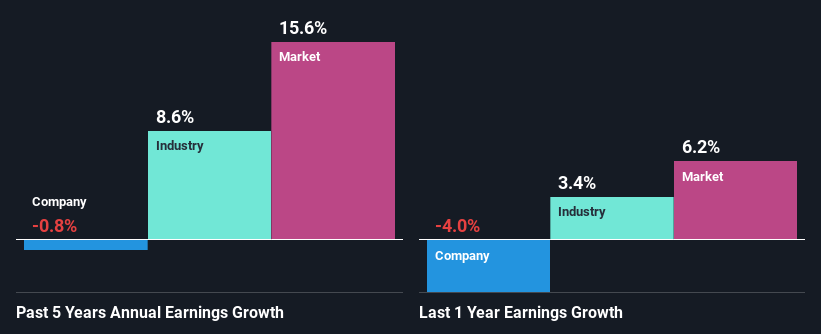Universal Corporation's (NYSE:UVV) Stock Been Rising But Financials Look Weak: Should Shareholders Be Worried?
Universal's (NYSE:UVV) stock is up by 4.1% over the past month. However, its weak financial performance indicators makes us a bit doubtful if that trend could continue. In this article, we decided to focus on Universal's ROE.
Return on Equity or ROE is a test of how effectively a company is growing its value and managing investors’ money. In simpler terms, it measures the profitability of a company in relation to shareholder's equity.
See our latest analysis for Universal
How Is ROE Calculated?
Return on equity can be calculated by using the formula:
Return on Equity = Net Profit (from continuing operations) ÷ Shareholders' Equity
So, based on the above formula, the ROE for Universal is:
7.7% = US$107m ÷ US$1.4b (Based on the trailing twelve months to December 2022).
The 'return' is the yearly profit. So, this means that for every $1 of its shareholder's investments, the company generates a profit of $0.08.
What Is The Relationship Between ROE And Earnings Growth?
Thus far, we have learned that ROE measures how efficiently a company is generating its profits. Depending on how much of these profits the company reinvests or "retains", and how effectively it does so, we are then able to assess a company’s earnings growth potential. Assuming everything else remains unchanged, the higher the ROE and profit retention, the higher the growth rate of a company compared to companies that don't necessarily bear these characteristics.
Universal's Earnings Growth And 7.7% ROE
At first glance, Universal's ROE doesn't look very promising. Next, when compared to the average industry ROE of 17%, the company's ROE leaves us feeling even less enthusiastic. As a result, Universal's flat net income growth over the past five years doesn't come as a surprise given its lower ROE.
We then compared Universal's net income growth with the industry and found that the average industry growth rate was 9.2% in the same period.
Earnings growth is a huge factor in stock valuation. The investor should try to establish if the expected growth or decline in earnings, whichever the case may be, is priced in. Doing so will help them establish if the stock's future looks promising or ominous. If you're wondering about Universal's's valuation, check out this gauge of its price-to-earnings ratio, as compared to its industry.
Is Universal Making Efficient Use Of Its Profits?
With a high three-year median payout ratio of 88% (implying that the company keeps only 12% of its income) of its business to reinvest into its business), most of Universal's profits are being paid to shareholders, which explains the absence of growth in earnings.
In addition, Universal has been paying dividends over a period of at least ten years suggesting that keeping up dividend payments is way more important to the management even if it comes at the cost of business growth.
Summary
On the whole, Universal's performance is quite a big let-down. As a result of its low ROE and lack of much reinvestment into the business, the company has seen a disappointing earnings growth rate. So far, we've only made a quick discussion around the company's earnings growth. You can do your own research on Universal and see how it has performed in the past by looking at this FREE detailed graph of past earnings, revenue and cash flows.
Have feedback on this article? Concerned about the content? Get in touch with us directly. Alternatively, email editorial-team (at) simplywallst.com.
This article by Simply Wall St is general in nature. We provide commentary based on historical data and analyst forecasts only using an unbiased methodology and our articles are not intended to be financial advice. It does not constitute a recommendation to buy or sell any stock, and does not take account of your objectives, or your financial situation. We aim to bring you long-term focused analysis driven by fundamental data. Note that our analysis may not factor in the latest price-sensitive company announcements or qualitative material. Simply Wall St has no position in any stocks mentioned.
Join A Paid User Research Session
You’ll receive a US$30 Amazon Gift card for 1 hour of your time while helping us build better investing tools for the individual investors like yourself. Sign up here

